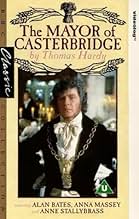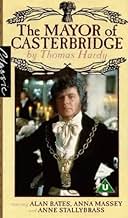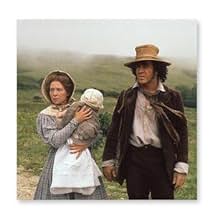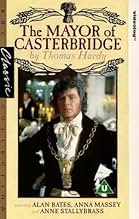AVALIAÇÃO DA IMDb
7,9/10
403
SUA AVALIAÇÃO
Adicionar um enredo no seu idiomaDrunken Henchard sells wife at fair. Sober, he reforms, becomes mayor but past catches up when wife returns years later.Drunken Henchard sells wife at fair. Sober, he reforms, becomes mayor but past catches up when wife returns years later.Drunken Henchard sells wife at fair. Sober, he reforms, becomes mayor but past catches up when wife returns years later.
Explorar episódios
Avaliações em destaque
A classic ancient BBC production: promising actors with a sparsely populated script, indecipherable accents, atrocious sound quality, and Extremely Long Takes Wherein Nothing Really Happens.
Potentially deeply emotional scenes are read through instead of explored. It's as if the text of the script is so sacred the actors daren't internalize it for fear of desecrating it.
Confusing jumps in time compound the badness. In addition, by trimming some exposition, we're not quite sure what transpires between some characters, or if we do know What, we're never sure Why.
This is an excellent soporific. It also works well if you need to exercise your thumb on the fast-forward button. It's difficult to miss an important piece of dialogue or even a scene. If "torpid" is what you're looking for, this is the mini-series for you.
Potentially deeply emotional scenes are read through instead of explored. It's as if the text of the script is so sacred the actors daren't internalize it for fear of desecrating it.
Confusing jumps in time compound the badness. In addition, by trimming some exposition, we're not quite sure what transpires between some characters, or if we do know What, we're never sure Why.
This is an excellent soporific. It also works well if you need to exercise your thumb on the fast-forward button. It's difficult to miss an important piece of dialogue or even a scene. If "torpid" is what you're looking for, this is the mini-series for you.
Please pardon the substandard Americanism, but "who'd a thunk" that the insanely imaginative bete noire of British television writing, Dennis Potter, could have written such a disciplined, book-faithful, beautifully-paced script as this. He pays full and respectful homage to the great Thomas Hardy's masterpiece.
No repetition of the accolades of prior reviewers is needed here. They're spot on.
What I would like to see, if I had control of casting of both the 1978 and 2003 versions, is a redistribution of the cast. For this exercise, I need a time warp.
Understanding, for example, that Polly Walker, who plays Lucetta in 2003, was only 12 years old in 1978, I would have preferred her (as she was in 2003) to Anna Massey as Lucetta in 1978. Walker has some beauty and magnetism and is believable as a man- hungry "fallen woman." Massey was undeniably an excellent actress, but as a vamp she simply can't cut it. To think Farfrae or Henchard could be attracted to her sensually is laughable. The suspension of disbelief here is too much for me to make. (By the way, her miscasting as Laura in the Pallisers is equally disturbing, as there is NO spark between her and Donal McCann in that series.)
Then I'd grab Juliet Aubrey out of the 2003 version and cast her in place of Anne Stallybrass - Aubrey portrays Susan more sensitively, more skilfully.
Janet Maw is superb as Elizabeth-Jane, so I'd leave her there, and not import Jodhi May into 1978 - May is too stilted as E-J. Both Purefoy and Galloway are very good as Farfrae, but Goodman is so very good in the minor role of Jopp that I would pull him out of 2003 to replace Lacey,
And last, I leave it to you as to Hinds or Bates as Henchard. They both turn in the most remarkable performances of their careers in Mayor of C. And that's why it's such a pleasure to watch both versions. despite the dreadful editing of Hardy in 2003.
No repetition of the accolades of prior reviewers is needed here. They're spot on.
What I would like to see, if I had control of casting of both the 1978 and 2003 versions, is a redistribution of the cast. For this exercise, I need a time warp.
Understanding, for example, that Polly Walker, who plays Lucetta in 2003, was only 12 years old in 1978, I would have preferred her (as she was in 2003) to Anna Massey as Lucetta in 1978. Walker has some beauty and magnetism and is believable as a man- hungry "fallen woman." Massey was undeniably an excellent actress, but as a vamp she simply can't cut it. To think Farfrae or Henchard could be attracted to her sensually is laughable. The suspension of disbelief here is too much for me to make. (By the way, her miscasting as Laura in the Pallisers is equally disturbing, as there is NO spark between her and Donal McCann in that series.)
Then I'd grab Juliet Aubrey out of the 2003 version and cast her in place of Anne Stallybrass - Aubrey portrays Susan more sensitively, more skilfully.
Janet Maw is superb as Elizabeth-Jane, so I'd leave her there, and not import Jodhi May into 1978 - May is too stilted as E-J. Both Purefoy and Galloway are very good as Farfrae, but Goodman is so very good in the minor role of Jopp that I would pull him out of 2003 to replace Lacey,
And last, I leave it to you as to Hinds or Bates as Henchard. They both turn in the most remarkable performances of their careers in Mayor of C. And that's why it's such a pleasure to watch both versions. despite the dreadful editing of Hardy in 2003.
'Casterbridge' is Dorchester, not Oxford. You can still stand in the street in Dorchester where Michael Henchard's wife stood, opposite the hotel where he was holding court as the mayor.
Two lines stand out from this memorable movie, lines for which I suppose Thomas Hardy must take most of the credit.
Henchard's first words on meeting his wife after twenty years: 'I don't drink.'
And his wife's explanation, when speaking of the man who had bid five guineas for her and her baby at the fairground auction: 'I couldn't leave him, Michael. Not after he'd paid all that money for me.'
(Both quotes from memory, but I think they are accurate.)
Two lines stand out from this memorable movie, lines for which I suppose Thomas Hardy must take most of the credit.
Henchard's first words on meeting his wife after twenty years: 'I don't drink.'
And his wife's explanation, when speaking of the man who had bid five guineas for her and her baby at the fairground auction: 'I couldn't leave him, Michael. Not after he'd paid all that money for me.'
(Both quotes from memory, but I think they are accurate.)
This is an excellent British TV production of Thomas Hardy's classic novel. I watched it after I saw the updated version on A&E starring Ciaran Hinds (which is good too). This version is about 3 times as long and more true to the novel. Excellent acting and on location filming make this a winner. It's in a live play style. Its about a drunken husband who sells his wife and daughter to a sailor at a rural fair because he can't support them. Years later, this decision comes back to haunt him. Good morality story of how a bad decision can ruin people for life.
10stancym
10 is not a high enough rating for this masterpiece. Even as we see the gorgeous and extremely talented Alan Bates as the mayor, making mistake after mistake, acting like a fool, struggling with his conscience, and sometimes making things right only to screw up again, we are moved by him. We have pity for a man who cannot get out of his own way, who is his own worst enemy.
The acting is superb, the scenery/sets beautiful and fitting of the time and place. Often meanings are conveyed through looks, expressions, and not an excess of words. The score by Carl Davis is appropriate and adds to the feel of the series, enhancing the whole thing.
What luck that this is on DVD, complete with biographies on Sir Alan Bates and Thomas Hardy, among other things. Don't miss this gem.
The acting is superb, the scenery/sets beautiful and fitting of the time and place. Often meanings are conveyed through looks, expressions, and not an excess of words. The score by Carl Davis is appropriate and adds to the feel of the series, enhancing the whole thing.
What luck that this is on DVD, complete with biographies on Sir Alan Bates and Thomas Hardy, among other things. Don't miss this gem.
Você sabia?
- CuriosidadesThis was one of the first major British television dramas to be shot entirely on videotape, using the new generation of portable video cameras and equipment for location footage. However, it was by no means the first BBC drama to do this, as series such as Doctor Who (1963) and Survivors (1975) had already used video for location footage as early as 1974-75.
- ConexõesEdited into Masterpiece Theatre: The Mayor of Casterbridge: Part 1 (1978)
Principais escolhas
Faça login para avaliar e ver a lista de recomendações personalizadas
- How many seasons does The Mayor of Casterbridge have?Fornecido pela Alexa
Detalhes
Contribua para esta página
Sugerir uma alteração ou adicionar conteúdo ausente

Principal brecha
By what name was The Mayor of Casterbridge (1978) officially released in Canada in English?
Responda


































